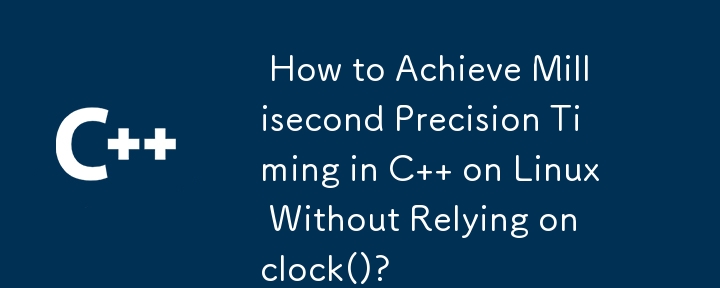

C : How to Obtain Milliseconds on Linux Without Clock() Limitations
Unlike Windows where clock() returns milliseconds, Linux's implementation rounds the result to the nearest 1000, resulting in second-level precision only. The need for millisecond-level timing prompts the question: Is there a standard C solution without using third-party libraries?
The Answer: gettimeofday()
The answer lies in the standard POSIX function gettimeofday(). This function provides high-precision timing information by populating a timeval structure with the current time. Here's a C example employing gettimeofday():
#include <sys/time.h>
#include <stdio.h>
#include <unistd.h>
int main()
{
struct timeval start, end;
long mtime, seconds, useconds;
gettimeofday(&start, NULL);
usleep(2000);
gettimeofday(&end, NULL);
seconds = end.tv_sec - start.tv_sec;
useconds = end.tv_usec - start.tv_usec;
mtime = ((seconds) * 1000 + useconds/1000.0) + 0.5;
printf("Elapsed time: %ld milliseconds\n", mtime);
return 0;
}This code demonstrates how to calculate the elapsed time in milliseconds by combining the seconds and microseconds components obtained from gettimeofday(). Note that the 0.5 addition is applied to round the result to the nearest integer.
The above is the detailed content of How to Achieve Millisecond Precision Timing in C on Linux Without Relying on clock()?. For more information, please follow other related articles on the PHP Chinese website!
 What is the use of java
What is the use of java
 How to restore IE browser to automatically jump to EDGE
How to restore IE browser to automatically jump to EDGE
 What are the spring frameworks?
What are the spring frameworks?
 OKEX official website
OKEX official website
 Advantages of plc control system
Advantages of plc control system
 The difference and connection between c language and c++
The difference and connection between c language and c++
 Introduction to the main work content of front-end engineers
Introduction to the main work content of front-end engineers
 How to shut down your computer quickly
How to shut down your computer quickly
 What are the css3 gradient properties?
What are the css3 gradient properties?




